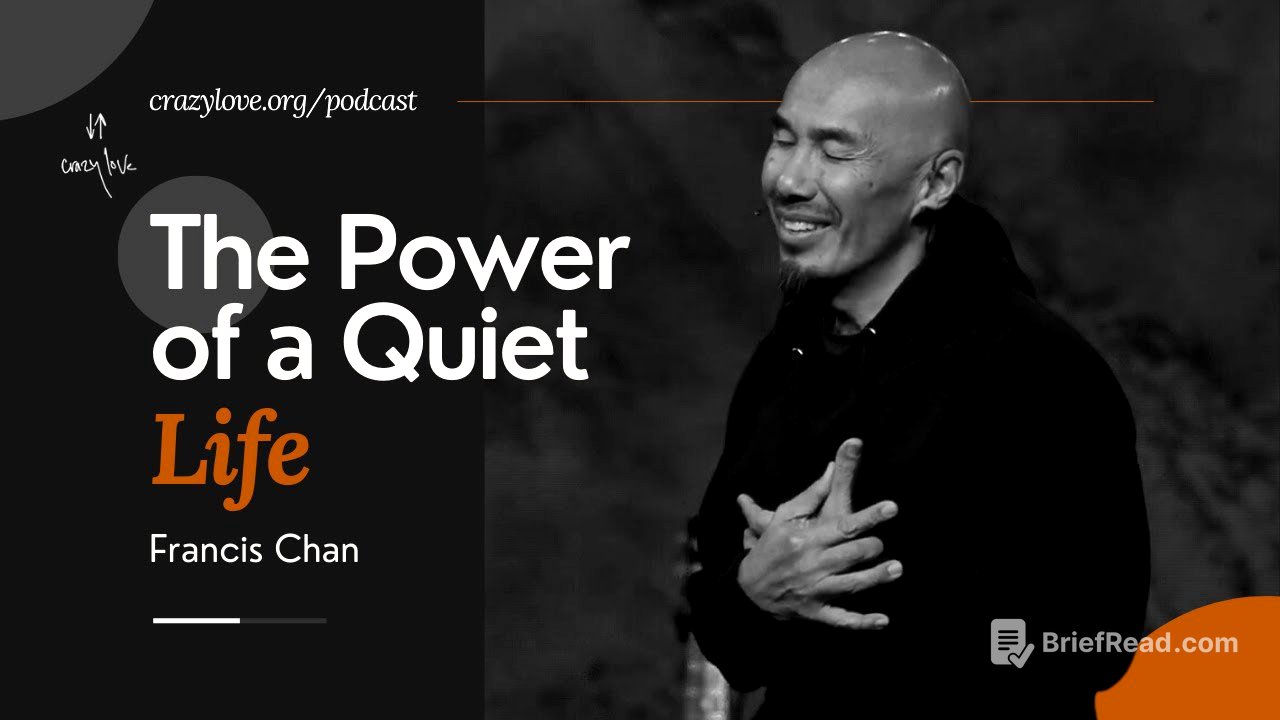TLDR;
This video explores the concept of living a quiet life, as opposed to seeking fame and recognition. It emphasizes the importance of faithfulness in small, private acts of service and devotion, suggesting that true reward comes from God's recognition, not public praise. The speaker encourages a shift in focus from building a platform to cultivating a deeper, more personal relationship with God, marked by secret acts of righteousness and a desire for divine intimacy.
- Emphasizes the value of a quiet, private life of faith over public recognition.
- Encourages secret acts of righteousness and a personal relationship with God.
- Warns against the dangers of selfish ambition and the pursuit of fame.
Prayer for Guidance [0:02]
The speaker begins with a prayer, asking for divine guidance and a loving heart. He seeks to speak only what God wants him to say, free from pride, anxiety, and the desire to please people, asking for a loving heart for everyone.
The Danger of the Stage [1:11]
The speaker describes the stage as a dangerous place, likening it to ingesting poison due to the temptations of pride, praise, and criticism. He emphasizes the importance of focusing on God's glory and maintaining humility while ministering, resisting the urge to seek validation from the audience. The goal is to deliver God's message without concern for personal recognition or fear of criticism, ultimately lifting God up.
Introduction to the Sermon [2:42]
The speaker expresses excitement about sharing a message he believes is divinely inspired, titled "The Power of a Quiet Life," based on 1 Thessalonians 4:11-12. He notes the unusual way the message came together, with verses, statements, and even the title being given to him in prayer. He feels a sense of obligation to share this specific message.
Aspire to Live Quietly [4:46]
The speaker reads from 1 Thessalonians 4:11-12, which encourages believers to "aspire to live quietly, to mind your own affairs, and to work with your hands." He contrasts this with the common ambition of many young people to speak to crowds and have a global impact. He questions the assumption that success in faith is measured by the size of one's audience or the loudness of one's voice.
Jesus' Example [7:00]
The speaker challenges the idea of constantly chasing larger crowds, asking if Jesus ever actively pursued crowds or encouraged his disciples to bring more people. He points out instances where Jesus ran from and escaped crowds. He questions what Jesus did at age 23, noting that we know he was a carpenter, suggesting that He lived a quiet life and worked diligently with His hands.
Faithfulness in Little Things [9:07]
Referencing Luke 16:10, the speaker emphasizes the principle that faithfulness in small things leads to faithfulness in much. He expresses concern that many are eager to be voices to the world without first demonstrating faithfulness in their personal lives. He cites 1 Timothy 3, which states that elders in the church must manage their own households well before caring for God's church, and warns against giving too much responsibility to new converts, which can lead to pride and condemnation.
Wisdom in Restraint [11:25]
The speaker shares a personal anecdote about his youth pastor, who wisely prevented him from teaching despite his eagerness, instead assigning him humble tasks like cleaning bathrooms and stacking chairs. This was done out of love, to protect him from pride. He also recounts a story from a mentor in India about Mother Teresa, who quietly served the poor without seeking promotion, until God made her a household name.
The Danger of Public Righteousness [13:38]
The speaker references Matthew 6, cautioning against practicing righteousness before others to be seen by them, as this negates the reward from God. He questions whether anyone still does good deeds in secret, lamenting the tendency to post even quiet times with Jesus on social media. He suggests that people tend to hide their sins while publicizing their good works, which is the opposite of what the Bible instructs.
Confessing Sins and Hiding Righteous Deeds [16:02]
The speaker urges listeners to confess their sins to one another and hide their righteous deeds, contrasting this with the common practice of doing the opposite. He envisions a generation where, upon their death, only their good works are uncovered, leaving outsiders with nothing negative to say. He humorously suggests starting a "sinstagram" to post one's sins and struggles, while quietly doing good works.
The Reward of Secrecy [18:30]
The speaker suggests that doing things in secret leads to a reward from God. He proposes that the reason some may not be experiencing many miracles is because their motive is to publicize them. He encourages listeners to follow Jesus' example in Mark 1:35, where Jesus went to a desolate place to pray while it was still dark, seeking solitude and communion with the Father.
Puzzling Passages [21:00]
The speaker discusses passages in the Bible where Jesus instructs people not to tell anyone about miracles they've experienced. He also mentions Revelation 10, where John is told to seal up what the seven thunders said, leaving only John knowing their message for 2,000 years. He uses these examples to illustrate the idea that some divine encounters are meant to be private and personal.
Miracles and Messages Just for You [23:06]
The speaker poses the idea that living a quiet life and doing things in secret might lead to God showing more miracles, but only for the individual's benefit. He suggests that seeking God in private might result in God thundering messages meant only for that person, with instructions not to share them. He asks if this would be enough or if the desire to post and gain followers would be frustrating.
The Power of a Quiet Life [25:30]
The speaker reiterates his belief in the power of a quiet life and the importance of being ambitious about living such a life, believing in eternal rewards. He acknowledges the desire to be a voice for God but warns against selfish ambition and jealousy, which can lead to vile practices. He prays for a new generation that desires to do things in private and seeks intimacy with God.
A Call to Repentance and New Ambitions [29:26]
The speaker prays for repentance for those who cannot think of a good deed they haven't publicized and for the sins they keep hidden. He asks the Holy Spirit to instill a deep desire for a secret place with God, asking for greater works to be done in secret, just for God. He asks for new ambitions, helping people to see the merit in working with their hands like Jesus did.
Prayer for Humility and Protection [33:02]
The speaker prays for those entrusted with a larger voice, asking that they be kept humble and faithful. He prays for protection for those who will step on the stage, guarding them from the plans of the evil one. He asks God to purify His bride so that His actions can be seen on Earth.









